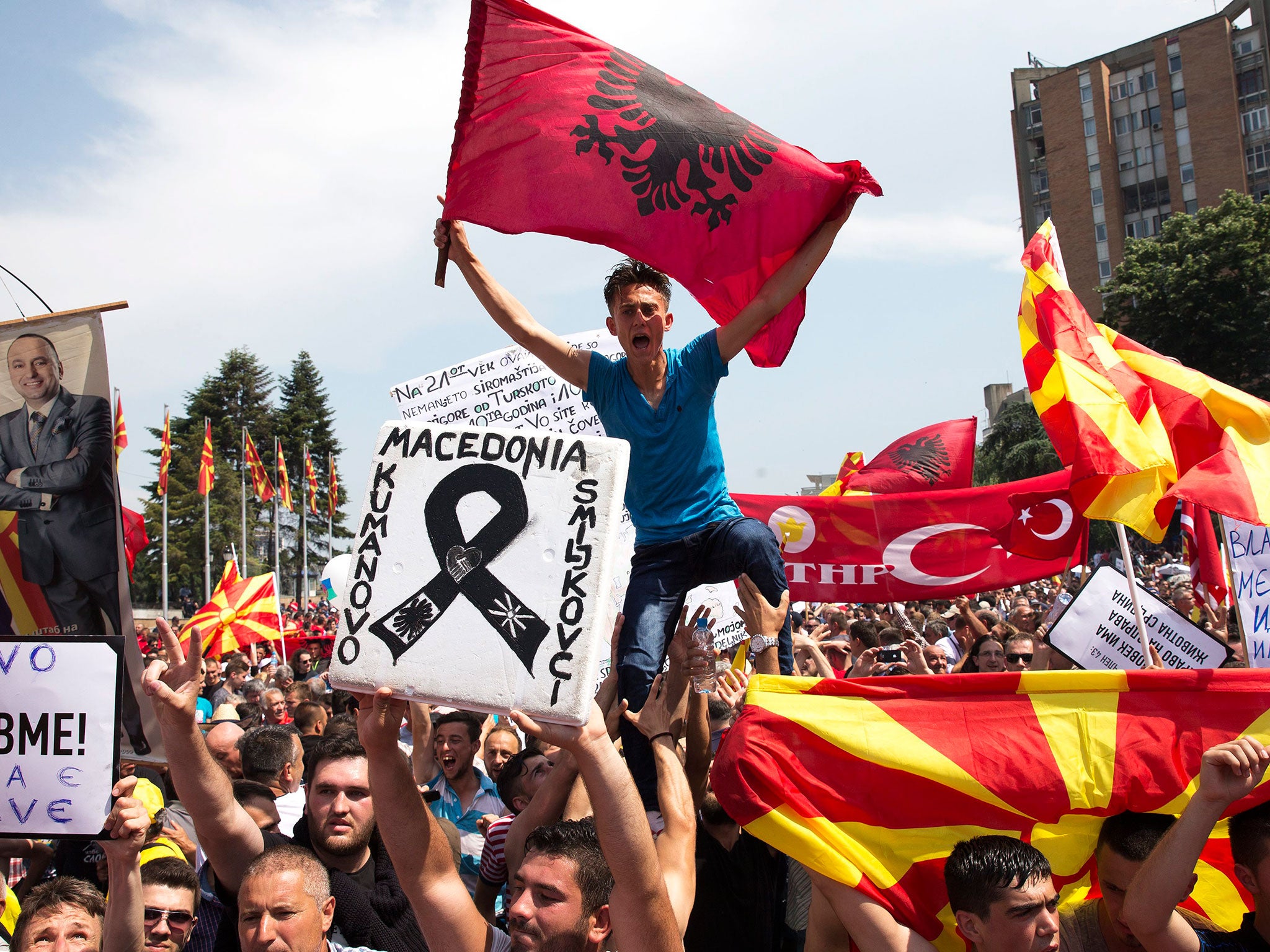Thousands of Macedonians unite in protest march to demand resignation of prime minister Nikola Gruevski
Critics say Mr Gruevski has moved to the right, stoking nationalism and monopolising power in coalition with a party of ethnic Albanian former guerrillas

Your support helps us to tell the story
From reproductive rights to climate change to Big Tech, The Independent is on the ground when the story is developing. Whether it's investigating the financials of Elon Musk's pro-Trump PAC or producing our latest documentary, 'The A Word', which shines a light on the American women fighting for reproductive rights, we know how important it is to parse out the facts from the messaging.
At such a critical moment in US history, we need reporters on the ground. Your donation allows us to keep sending journalists to speak to both sides of the story.
The Independent is trusted by Americans across the entire political spectrum. And unlike many other quality news outlets, we choose not to lock Americans out of our reporting and analysis with paywalls. We believe quality journalism should be available to everyone, paid for by those who can afford it.
Your support makes all the difference.Their government on the ropes after months of damaging wiretap revelations, tens of thousands of protesters took to the streets of Macedonia’s capital, waving Macedonian and Albanian flags in a dramatic display of ethnic unity.
Crowds packed the central avenue in front of Prime Minister Nikola Gruevski’s government office, angry over a flood of disclosures that the West says have cast serious doubt on the state of democracy in the former Yugoslav republic.
The crisis rocking Mr Gruevski’s nine-year conservative rule is the worst since Western diplomacy dragged the country from the brink of civil war during an ethnic Albanian insurgency in 2001, promising it a path to EU and Nato membership.
A dispute with neighbouring Greece over Macedonia’s name has halted its Western integration, and in that time, critics say Mr Gruevski has tilted to the right, stoking nationalism and monopolising power in coalition with a party of ethnic Albanian former guerrillas.
Since February, he has faced a wave of embarrassing revelations against him and his ministers, contained in taped conversations that appear to expose tight government control over journalists, judges and the conduct of elections.
The opposition Social Democrat leader Zoran Zaev says the tapes, which he has dubbed “bombs”, were made illegally by the government as part of a mass surveillance operation targeting 20,000 allies and opponents alike, and were leaked to him by a whistleblower.
One demonstrator, Andrej Poposki, 45, who had travelled by bus from the town of Prilep, 80 miles to the south, said: “I locked my shop, packed my things and came to Skopje. We have to take a stand and confront the criminals. They belong in jail, not in government.”
Mr Gruevski has not disputed that the voices on the tapes are genuine but says that he did not order the recordings and that the audio has been doctored. Mr Zaev has been charged with violence against the state.
Mr Zaev says several thousand demonstrators plan to camp out in the streets until the prime minister quits.
Mr Gruevski, his Communist-era government building recently renovated with a white shell of neo-classical pillars and pediments as part of a gaudy city makeover, has refused to do so. He has called his own rally for today, stoking fears of a confrontation.
Western diplomats in Skopje are trying to mediate a solution to the crisis, questioning the government’s commitment to democracy and European values.
On 9 and 10 May, a police raid on a northern ethnic Albanian neighbourhood left 18 people dead: eight police officers and 10 Albanians who were described by the government as terrorists.
Mr Gruevski said that police had thwarted a terrorist plot, but Albanians and some foreign analysts said the timing suggested the government was trying to create a diversion.
Ethnic Albanians account for some 30 per cent of the population. While the two communities live largely separate lives, there is little sign of appetite on either side for a return to conflict.
Sulejman Rushiti, an ethnic Albanian who once served as education minister under Mr Gruevski, joined the protest against what he called “an authoritarian regime”.
“This is the first time I have physically protested together with Macedonians,” he told Reuters.
Weighing in on Saturday, Russia’s foreign ministry accused “Western organisers” of trying to foment a revolution against a government that has refused to join European sanctions against Russia over Ukraine.
Reuters
Join our commenting forum
Join thought-provoking conversations, follow other Independent readers and see their replies
Comments